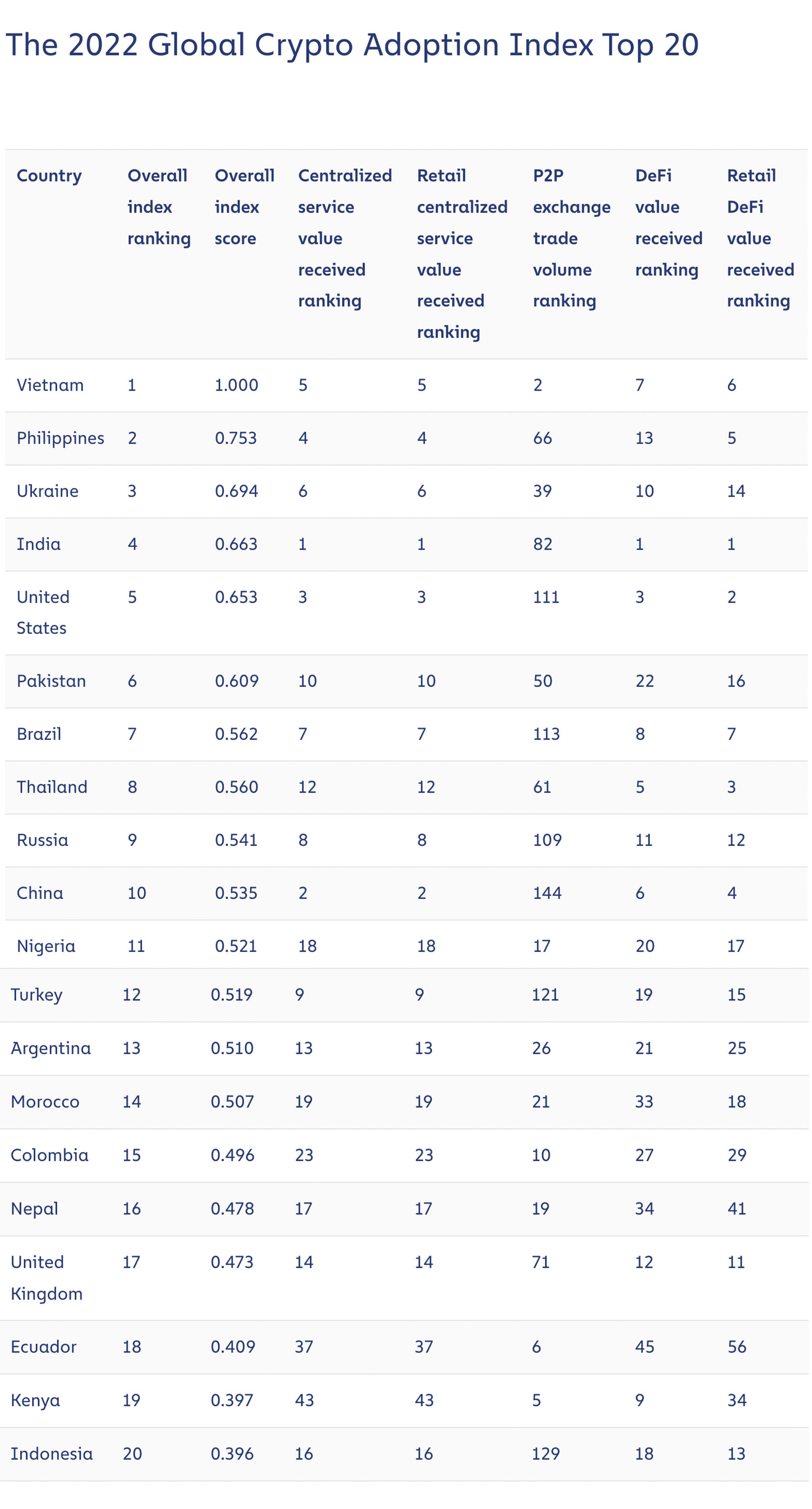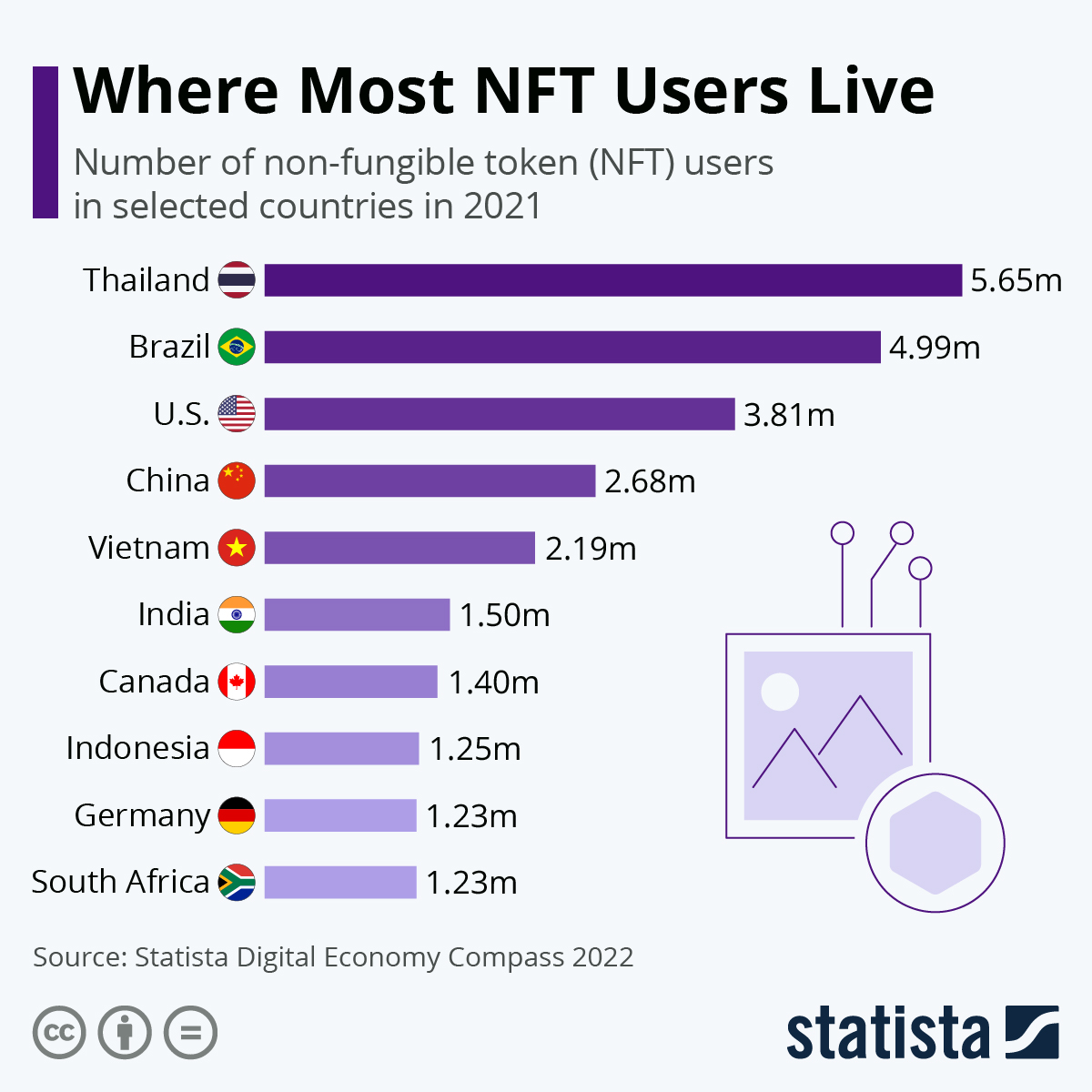
Vietnam and Philippines Lead The World in Retail Crypto Adoption
by Fintech News Singapore October 6, 2022For the second consecutive year, Vietnamese consumers are being recognized as the biggest adopters of cryptocurrencies, recording the highest usage of crypto-related tools, products and services, compared to other nations.
This is the finding of Chainalysis’ 2022 Global Crypto Adoption Index, an annual study which analyzes transactional data from 140+ countries to determine which nations are the biggest users of crypto.
This year again, emerging markets are dominating the index, with Vietnam taking the lead, followed by the Philippines.
High adoption in emerging markets can be in part explained by the use of crypto to conduct remittances in these particular economies, as well as their perceived utility as an effective hedge against inflation and political uncertainty, the report says. These countries also tend to lean on Bitcoin and stablecoins more than other countries.
A look at sub-ranking shows that Vietnam is seeing extremely high adoption across centralized cryptocurrency tools, decentralized finance (DeFi), and peer-to-peer (P2P) exchange, findings that corroborate other sources which have pointed out Vietnamese consumers’ rising penchant for crypto.

The 2022 Global Crypto Adoption Index. Chainalysis
Since 2019, Vietnam has consistently ranked among the world’s top 10 biggest adopters of cryptocurrencies, according to Statista’s Global Consumer Survey, with about two out of ten people domestically either owning or using cryptocurrencies between 2019 and 2022.
From July 2021 to June 2022, Vietnam recorded US$112.6 billion in crypto buying and selling value, Chainalysis estimates, a figure that puts the country at the second position in the Association of Southeast Asian Nations (ASEAN) in terms of crypto trading volume, behind only Thailand (US$135.9 billion).
Vietnamese consumers have also grown fond of non-fungible tokens (NFTs) and blockchain gaming, which totaled a reported 2.19 million users, as of 2021. The number ranked Vietnam as the world’s fifth largest pool of NFT users in absolute number, behind Thailand (5.65 million), Brazil (4.99 million), the US (3.81 million) and China (2.68 million).

Where most NFT users live, Source: Statista Digital Economy Compass 2022
After Vietnam, the Philippines took the second place in this year’s Global Crypto Adoption Index, ranking high in usage of centralized crypto services, like exchange platforms, and DeFi tools.
In the Philippines, crypto penetration stands at about 15%, according to Finder’s Crypto Adoption September 2022. The study, which polled 12,000+ people in the country, found that about 11.1 million people domestically own crypto.
Data from the central bank, Bangko Sentral ng Pilipinas (BSP), have also revealed that crypto trading is booming. In the first half of 2021, the volume of crypto transactions grew 362% year-on-year (YoY) to nearly 20 million. These transactions, according to a report, were worth PHP 105.93 billion (US$1.8 billion), up 71% on an annual basis.
Rising retail adoption of crypto in the Philippines comes at the time when the government itself has shown interest in exploring use cases involving blockchain and digital currencies.
In May, the Department of Science and Technology started a blockchain training program for its researchers with hopes to adopt the technology in areas such as healthcare, financial support, emergency aid, issuance of passports and visas, trademark registration and government records.
BSP, meanwhile, has been working on a pilot project to test the use of a wholesale central bank digital currency (CBDC) for large-value financial transactions among selected financial institutions.
Like the Philippines, Vietnam officials too are seeing the appeal of issuing a CBDC. Last year, Vietnam’s Prime Minister Pham Minh Chinh asked the country’s central bank, the State Bank of Vietnam (SBV), to study and begin working on a pilot project involving a blockchain-based CBDC. SBV has reportedly been looking to conduct a market study with Soramitsu and other parties, though no commitment to issue a digital currency has so far been made.
But the surge in crypto usage and trading in Vietnam has also prompted regulators to work on building up the legal framework to tackle issues relating to the emerging asset class.
In fact, new rules are expected to be introduced soon to address challenges such as the use of crypto to launder money and fund terrorism, as well as proper crypto management, Governor of SBV Nguyen Thi Hong, said earlier this month during a discussion session with the National Assembly.
Featured image credit: edited from Freepik






